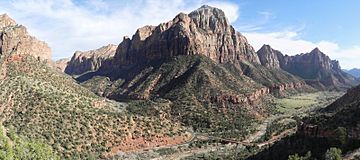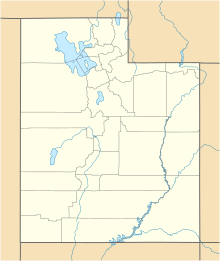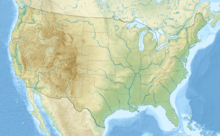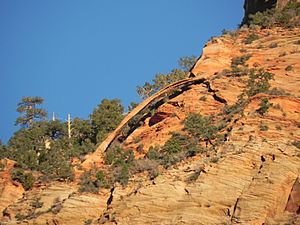Bridge Mountain (Utah) facts for kids
Quick facts for kids Bridge Mountain |
|
|---|---|

Bridge Mountain from northwest
|
|
| Highest point | |
| Elevation | 6,803 ft (2,074 m) |
| Prominence | 1,123 ft (342 m) |
| Isolation | 1.32 mi (2.12 km) |
| Parent peak | The East Temple (7,709 ft) |
| Geography | |
| Location | Zion National Park Washington County, Utah United States |
| Parent range | Colorado Plateau |
| Topo map | USGS Springdale East |
| Type of rock | Navajo sandstone |
| Climbing | |
| Easiest route | class 4 scrambling |
Bridge Mountain is a tall mountain in Zion National Park in Utah, United States. It stands about 6,803 feet (2,074 meters) high. This mountain is famous for being made of a special type of rock called Navajo Sandstone.
Contents
Discovering Bridge Mountain
Bridge Mountain is found in the eastern part of Zion National Park. It's close to the park's main office and the south entrance of Zion Canyon.
How the Mountain Got its Name
The mountain was first called Crawford Mountain. This was to honor the Crawford family, who were early settlers in the canyon. But in 1934, its name was officially changed to Bridge Mountain. This happened after a "natural bridge" was found on its slopes.
The Difference: Arch vs. Bridge
Even though it was called a "bridge," what was found was actually a natural arch. For many years, park rangers told visitors it was a natural bridge. This is why the mountain kept its name.
A natural bridge is a type of arch that is mainly shaped by water. To avoid confusion, the National Park Service later named this specific rock formation Crawford Arch.
What Bridge Mountain is Made Of
Water from the mountain flows into streams that feed the North Fork Virgin River. Bridge Mountain is mostly made of Navajo Sandstone. You can also see red shale rock from the Kayenta Formation on its lower parts.
Weather at Bridge Mountain
The best times to visit Bridge Mountain are in spring and fall. The area has a Cold semi-arid climate. This means the coldest month has an average temperature below 32 °F (0 °C). Also, at least half of the yearly rain falls in spring and summer.
This desert climate gets less than 10 inches (250 mm) of rain each year. Snowfall in winter is usually light.
 | Dorothy Vaughan |
 | Charles Henry Turner |
 | Hildrus Poindexter |
 | Henry Cecil McBay |




